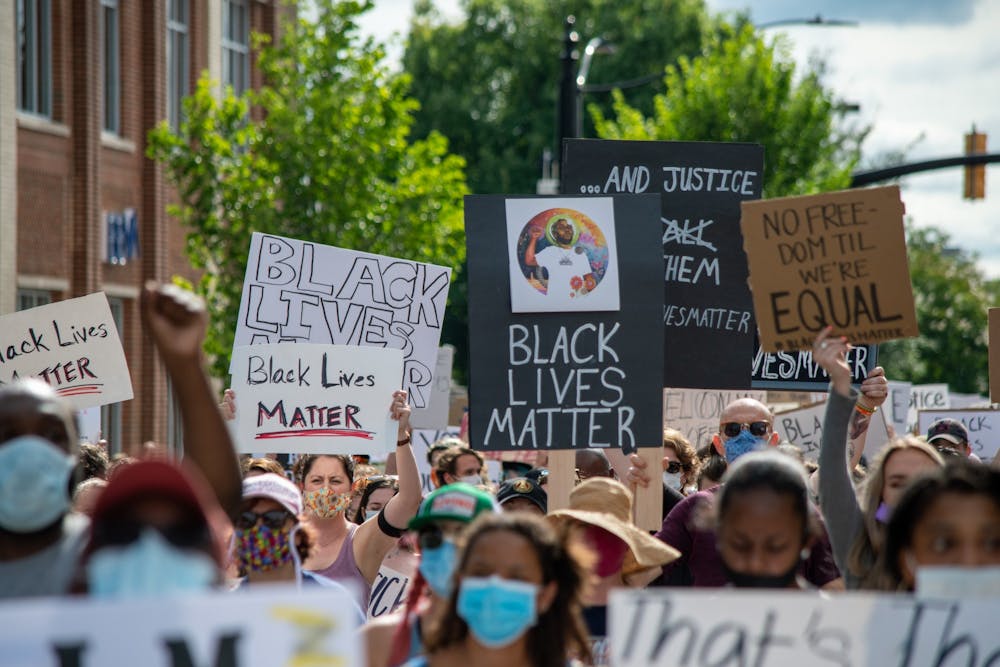In the midst of a pandemic that rocked the world, people from all walks of life left the safety and protection of their home to pick up a mask and signs to protest the death of George Floyd at the hands of a Minneapolis police officer in late May.
The event, only the latest in a long history of Black civil rights in America, sparked an international conversation about race and how Black Americans are profiled in communities meant to serve them as they do white Americans.
The Auburn community was not exempt from this discussion.
In July, an Instagram page called Black at Auburn appeared, following the lead of other Instagram pages for other universities with similar goals: sharing the experiences of Black, indigenous and people of color, or BIPOC, students and community members at Auburn and interrogating the idea of the Auburn Family.
The page is submission-based, with faculty, students or members of the community direct messaging the page or filling out a form to share their experiences.
“I shared two stories on the page,” said Sydney Talbert, senior in marketing. “The first one was about my first weekend in Auburn. Me and some friends were walking around downtown trying to find something to get into. As we were walking past Toomer’s [Corner], a car of white girls listening to rap music stopped at the red light, and when they saw us they rolled down their window and started rapping the lyrics to us and made sure to put emphasis on the n-word each time it came up. My friends and I were so angry and hurt that we just got in the car and went back to my dorm.”
This experience is one of many just like it, with at least 207 submissions and counting as more people submit their experiences every day. The experiences range from blatant racism to microaggressions from other students and even faculty.
Many stories share similar experiences of BIPOC students feeling belittled or overlooked by professors as they made offhand comments on their intellectual abilities.
“I was a fourth-year Veterinary student,” one submitter shared. “I and a group of fellow Black AU grad students went out to dinner to celebrate a friend getting her Ph.D. An Auburn professor approached us and asked if we were Tuskegee students. He was shocked when we told him we were all graduate students at Auburn …and that I was actually a student on his current clinical rotation.”
The page has been growing steadily since its inception as more people have tuned in and shared their experiences of being a BIPOC in Auburn.
Most BIPOC who encounter the page aren’t surprised that these incidents occur, but some didn’t previously know the extent.
“I personally haven’t experienced any blatant racism towards me at Auburn, but I know of friends who have,” said Jarious Avery, sophomore in biomedical sciences. “My initial reaction to everything was disappointment and disgust that some people could be that disrespectful.”
For seniors and alums, like Talbert, who has experienced it firsthand, and Michael Oaktree, who graduated in 2019, the stories come as no shock, though Oaktree expressed that he was pleasantly surprised at the community, validation, and positive conversation born from the page.
Fellow students fill the comments with support and repost the stories on the page to their own pages in hopes of reaching more of the Auburn Family.
Although the page started and will continue to be an outlet for BIPOC to share, students, faculty members and members of the community are looking to the University for concrete plans to improve the environment for those students.
“Auburn reveres in the homogeneity that results in an overwhelming majority of students being white, wealthy and Alabama-raised,” Oaktree said. “I absolutely think Auburn has the capacity for change. One thing Auburn does well is cultivate leaders who go on to shape their respective communities in a multitude of ways. The trick is capturing that talent while they’re still on campus and directing it at making more equitable and accessible, rather than using student leadership positions to uphold structures that disproportionately benefit affluent white students.”
In a way, Auburn has already started taking steps toward this through their University task force on equality and inclusion, which includes a mix of student, faculty and staff members.
Oaktree also suggests that staff should be trained to intervene when the culture of organizations becomes so intolerant that it makes it difficult to capture that talent.
“IFC, Panhellenic, SGA and other influential organizations have an extreme level of autonomy despite all having advisors,” Oaktree said. “I understand the importance of making your own decisions as a college organization, and how that grows leadership, but the cultures of many organizations are so unchecked that their actions would get them fired if it were a professional workplace. Hold advisors accountable.”
In addition to putting students in better positions to make change, Talbert suggests requiring all students to take the class Living and Communicating in a Diverse Society and better training for faculty to avoid the careless comments and microaggressions.
“Auburn could do with some inclusivity and cultural training for its professors and workers, because the amount of microaggressions that I have seen over the almost four years I’ve been at Auburn is ridiculous,” Talbert said.
Bobby Woodard, the senior vice president for Student Affairs, said that the Office of Student Affairs had previously sought approval in 2016 from the Provost’s Office to establish the Bias Education and Response Team.
“The team receives and responds to issues of racism that occur on campus,” Woodard said. “Their responses to many of those issues have resulted in educational experiences or recommendation for further action that directly confronts racism on campus.”
The plan from Student Affairs for the fall semester is better implementing and promoting BERT to ensure that all students are aware that there is a safe space to report incidents. Additionally, the staff will participate in training.
“We will provide training programs to assist us in educating more of our students about what racism is and how to combat racism in our campus community,” Woodard said. “And work to implement the recommendations from the University task force addressing racism has been charged with creating a plan for how to move forward and be more inclusive as a University.”
Like Avery, Woodard said he was disturbed to read about the experiences of Black students.
“I don’t want anyone to experience what they described on campus,” Woodard said. “I have been made aware of personal reports from students; however, many of the experiences shared on the page were ones I had not heard before.”
Woodard said that Student Affairs has all been doing a lot of personal reflection, and will put in the effort to create a better environment for Black students.
“I will continue to reach out to more students and involve them in the process so that we can ensure we have diverse viewpoints and ideas,” Woodard said.
Oaktree thinks one of the steps to change begins with just an acknowledgment of all the experiences shared on Black at Auburn by the administration.
“Them coming out and acknowledging that these things happened and continue to happen within the ‘Auburn Family’ is crucial to moving forward,” Oaktree said.
Oaktree’s experience, shared on the page on July 29, criticizes the idea of the Auburn Family for BIPOC.
“Everything is shaped to make you feel like you are indebted to Auburn,” Oaktree said. “That Auburn is what gave you the opportunity to rise up. The truth is, I got amazing opportunities from people and institutions who had never heard of Auburn. They were impressed with me, my initiative and my skills. Black Auburn grads are amazing and would have thrived at any institution, and we chose to do so at Auburn.”
The problem, Oaktree said, was that most of the time, Auburn didn’t choose us back.
Do you like this story? The Plainsman doesn't accept money from tuition or student fees, and we don't charge a subscription fee. But you can donate to support The Plainsman.





